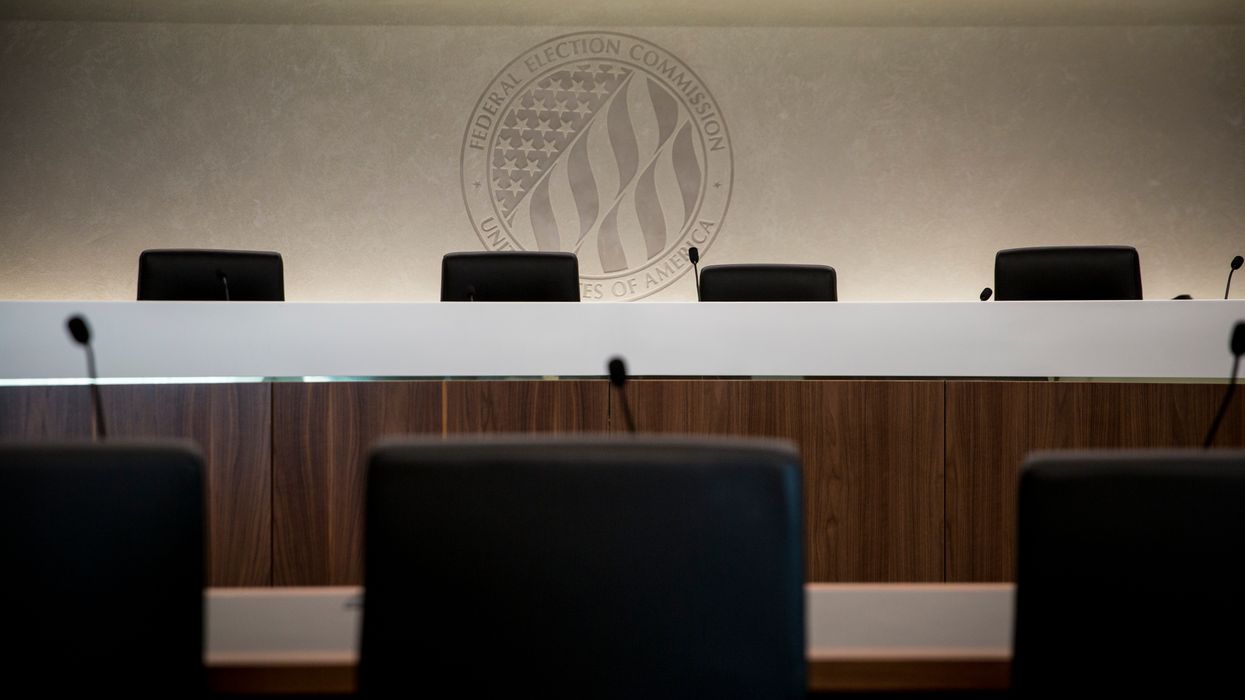The already minimalist regulation of money in national politics, which has been completely suspended for more than a year, may get started again. But it won't be until after the end of a campaign fueled by an astonishing $14 billion in donations and spending, some of it questionable and none of it policed.
The Senate seems likely to confirm three new members of the Federal Election Commission during its lame duck session starting the second week of November, creating the quorum needed to mop up after the voting is over — and the ocean of money has been given to and spent by congressional and presidential candidates.
A record-long logjam at the FEC started to break Wednesday, when President Trump announced nominees to fill two of the seats: Republican senior congressional aide Sean Cooksey and Democratic senior agency attorney Shana Broussard.
Because the law is designed to ensure either bipartisanship at the FEC or total gridlock — the situation for most of the past decade — the president effectively had to propose one person from the opposing party.
Senate Rules and Administration Chairman Roy Blunt, whose panel screens nominees for the FEC, said he would move quickly to fill the empty chairs. And it's highly unlikely the president would have made the announcement without advance clearance from Majority Leader Mitch McConnell. (Nominees left waiting at the end of the year would have to start the process over, or else potentially be replaced next year if Joe Biden becomes president.)
"Given the unique challenges facing campaigns now and in the months ahead due to the coronavirus pandemic, I urge my colleagues to support our efforts to fill these vacancies and ensure the FEC is able to do its job," Blunt said after the White House announcement.
For all but one month in the last 14, the commission has had just three members, short of the quorum required to consider complaints about misbehavior by candidates or political organizations, let alone set new policies or even hold public meetings.
The agency has more than 400 cases on its enforcement docket. FEC attorneys have readied recommendations for next steps in half of them, which must be reviewed by the commission. The other half are not as far along in the pipeline.
Cooksey currently serves as general counsel to Missouri's other senator, Republican Josh Hawley, after working as deputy chief counsel to Republican Sen. Ted Cruz of Texas.
Broussard has been a senior FEC attorney for longer than a decade. She was previously an IRS attorney and a prosecutor in New Orleans. Senate Democrats have been promoting her nomination for more than a year. She would be the first Black commissioner since the FEC was created in 1975 in response to the campaign finance abuses of Watergate.
The Rules panel's top Democrat, Amy Klobuchar of Minnesota, agreed that the FEC needs to be fully functioning but lambasted the president's timing.
"We need to stop treating the agency that's charged with keeping corruption out of our elections like a political pawn," Klobuchar said. "We must restore trust in the FEC."
A third vacancy would be filled by attorney Allen Dickerson of the Institute for Free Speech, which advocates for almost total deregulation of money in politics. Trump nominated him in June, after Caroline Hunter resigned.
If all three are confirmed by the Senate, not only would a quorum be restored but the commission would have all six seats filled for the first time since March 2017.
Commissioners are supposed to serve for six years, but can stay on if no replacement arrives. That's the case for Democrat Ellen Weintraub and Independent Steven Walther, who have both been on the commission for more than a decade.
Trey Trainor, who joined the commission in June and immediately became chairman (the job rotates) said he was excited about the potential to get back to work.
Weintraub said the news was "welcome, but long overdue" considering the FEC has been out of commission since September 2019 except for this June — after Trainor arrived but before Hunter left.
The Center for Responsive Politics, a nonprofit that vigorously tracks campaign finances, estimated this week that the total cost of the 2020 campaign for president and Congress would reach $14 billion — double the grand total just four years ago.
With this unprecedented level of political spending, having the FEC unable to regulate the campaign cash or enforce rules has been a travesty, said Meredith McGehee, executive director of Issue One, a bipartisan nonprofit that advocates for a broad democracy reform agenda. (It owns but is journalistically independent from The Fulcrum.)
"These new nominations are too little, too late," she said. "For the FEC to be an effective watchdog, it needs to not only have just a quorum but a quorum of commissioners who are dedicated to upholding our nation's campaign finance laws."




















